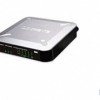Cisco RVS4000 User Guide - Page 15
Setup > WAN, - remote management
 |
UPC - 745883572977
View all Cisco RVS4000 manuals
Add to My Manuals
Save this manual to your list of manuals |
Page 15 highlights
Chapter 5 Setting Up and Configuring the Router Network Setting Status LAN IP Displays the IP address of the Router's LAN interface. WAN IP Displays the IP address of the Router's WAN interface. If this address was assigned using DHCP, click DHCP Release to release the address, or click DHCP Renew to renew the address. Mode Displays the operating mode, Gateway or Router. Gateway Displays the Gateway address, which is the IP address of your ISP's server. DNS 1-2 The IP addresses of the Domain Name System (DNS) server(s) that the Router is using. DDNS Indicates whether the Dynamic Domain Name System (DDNS) feature is enabled. DMZ Host Indicates whether the DMZ Hosting feature is enabled. Firewall Setting Status DoS (Denial of Service) Indicates whether the DoS Protection feature is enabled to block DoS attacks. Block WAN Request Indicates whether the Block WAN Request feature is enabled. Remote Management Indicates whether the Remote Management feature is enabled. IPSec VPN Setting Status IPSec VPN Summary Click the IPSec VPN Summary hyperlink to display the VPN > Summary screen. Tunnel(s) Used Displays the number of VPN tunnels currently being used. Tunnel(s) Available Displays the number of VPN tunnels that are available. Log Setting Status E-mail If this displays Email cannot be sent because you have not specified an outbound SMTP server address, then you have not set up the mail server. Click the E-mail hyperlink to display the Administration > Log screen where you can configure the SMTP mail server. Setup > WAN Internet Connection Type The Router supports six types of connections. Each Setup > WAN screen and available features will differ depending on what kind of connection type you select. 4-Port Gigabit Security Router with VPN Automatic Configuration - DHCP By default, the Router's Configuration Type is set to Automatic Configuration - DHCP, and it should be kept only if your ISP supports DHCP or you are connecting through a dynamic IP address. Automatic Configuration - DHCP Static IP If your connection uses a permanent IP address to connect to the Internet, then select Static IP. Static IP Internet IP Address This is the Router's IP address, when seen from the WAN, or the Internet. Your ISP will provide you with the IP Address you need to specify here. Subnet Mask This is the Router's Subnet Mask, as seen by external users on the Internet (including your ISP). Your ISP will provide you with the Subnet Mask. Default Gateway Your ISP will provide you with the Default Gateway Address, which is the ISP server's IP address. Primary DNS (Required) and Secondary DNS (Optional) Your ISP will provide you with at least one DNS (Domain Name System) Server IP Address. 8















